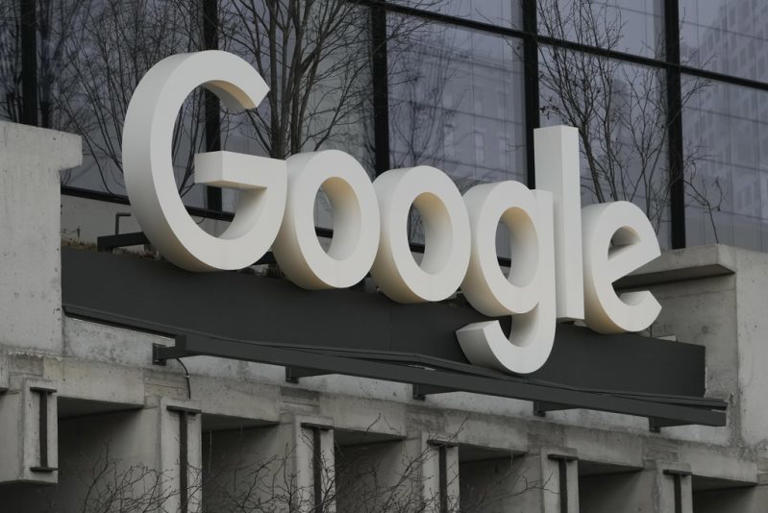The Looming Threat Of Google's Demise: Antitrust Concerns And The Fight For Competition

Table of Contents
Google's Monopolistic Practices and Market Domination
Google's vast reach extends across numerous sectors, raising serious concerns about monopolistic practices and their impact on consumers and the broader tech ecosystem. This dominance isn't just about market share; it's about the potential stifling of innovation and the erosion of consumer choice.
Search Engine Dominance
Google's near-total control of the search market is perhaps its most visible demonstration of market power. This dominance has significant implications for competition and consumer choice.
- Over 90% market share globally: This staggering figure illustrates Google's overwhelming presence in the search engine landscape.
- Difficult for competitors like DuckDuckGo or Bing to gain traction: Despite offering alternatives, smaller search engines struggle to compete against Google's established network effects and brand recognition. This limited competition reduces consumer choice and potentially stifles innovation in search technology.
- Potential for biased search results favoring Google's own products: Concerns exist that Google prioritizes its own products and services in search results, potentially disadvantaging competitors and manipulating consumer choices. This raises questions about the neutrality and objectivity of search results.
Android's Market Share and Pre-installed Apps
Google's Android operating system dominates the global smartphone market. This dominance, coupled with pre-installation requirements for Google apps, raises significant antitrust concerns.
- Predominant OS on smartphones worldwide: Android's widespread adoption gives Google considerable control over the mobile ecosystem.
- Obligation for manufacturers to pre-install Google apps: Many Android manufacturers are required to pre-install Google apps, giving Google a significant advantage over competing apps and services. This practice effectively locks out competitors and limits consumer choice.
- Impact on the viability of competing app stores and app developers: The dominance of the Google Play Store makes it challenging for alternative app stores to gain traction, hindering competition and innovation in app development.
Advertising Monopoly
Google's substantial control of the online advertising market through AdWords and AdSense provides it with immense leverage over publishers and advertisers.
- Dominance in AdWords and AdSense: Google's advertising platforms control a massive portion of the online advertising revenue, creating a significant barrier to entry for competitors.
- Potential for manipulating ad pricing and placement: Concerns exist about Google's ability to manipulate ad pricing and placement, potentially disadvantaging smaller advertisers and publishers.
- Impact on smaller businesses' ability to compete: Google's dominance in online advertising can make it difficult for smaller businesses to compete effectively, potentially leading to market consolidation and reduced diversity.
The Arguments for Increased Regulatory Oversight
The concerns surrounding Google's market power necessitate increased regulatory oversight to protect consumers and promote a healthy, competitive digital market.
Protecting Consumer Choice and Innovation
Increased regulation is crucial to fostering competition and preventing Google from stifling innovation.
- Ensuring fair competition leads to better products and services for consumers: A competitive market drives innovation and leads to better products and services at lower prices.
- Promoting the development of alternative search engines and operating systems: Regulation can help level the playing field, enabling alternative platforms to compete more effectively.
- Preventing the exploitation of market power: Regulatory intervention is necessary to prevent Google from using its dominance to unfairly disadvantage competitors.
Preventing Anti-Competitive Practices
Stronger antitrust laws are necessary to prevent Google from engaging in anti-competitive behavior.
- Addressing concerns regarding data privacy and misuse of user information: Regulation can help ensure that Google's use of user data is transparent and respects privacy rights.
- Preventing the leveraging of one market dominance to gain control of others: Regulations should prevent Google from using its dominance in one market to gain unfair advantages in others.
- Ensuring a transparent and fair digital marketplace: Robust regulation is essential for fostering a fair and transparent digital economy.
The Role of International Cooperation
Addressing Google's global influence requires international cooperation to ensure a consistent approach to antitrust regulation.
- Harmonizing regulatory frameworks across different jurisdictions: A unified approach to antitrust regulation is crucial to prevent regulatory arbitrage.
- Sharing information and best practices among regulatory bodies: International cooperation can enhance the effectiveness of antitrust enforcement.
- Coordinating enforcement actions to prevent regulatory arbitrage: Coordination among regulatory bodies is essential to prevent companies from exploiting differences in regulatory frameworks.
Potential Consequences of Google's Continued Dominance
The unchecked growth of Google's power has potentially severe consequences for consumers and the broader economy.
Stifled Innovation
Lack of competition can lead to stagnation and a lack of innovation in the tech industry, resulting in slower technological advancements and reduced consumer benefits.
Higher Prices for Consumers
Reduced competition can result in higher prices for goods and services, as consumers have fewer options and less leverage in the marketplace.
Reduced Consumer Choice
Consumers may have fewer options and less control over their digital experiences, leading to less diverse and potentially less satisfying options.
Increased Data Privacy Concerns
A lack of competition increases the risk of data misuse and privacy violations, as consumers have less choice and less leverage to protect their data.
Conclusion
The looming threat of Google's unchecked dominance is a serious concern. Its monopolistic practices across various sectors raise serious antitrust issues that demand immediate attention. Protecting consumer choice, fostering innovation, and ensuring a level playing field require stronger regulatory oversight and international cooperation. The fight for competition in the digital age is crucial, and failure to address Google's dominance could have far-reaching consequences. We must actively promote a more balanced and competitive tech landscape to avoid the potential demise of innovation and consumer choice. Learn more about the ongoing debates surrounding Google's antitrust issues and how you can support efforts to promote competition in the digital marketplace. Join the conversation about the future of the internet and fight for a fairer digital economy—let's prevent the demise of genuine competition and ensure a thriving, competitive tech sector for all.

Featured Posts
-
 Why Current Stock Market Valuations Shouldnt Concern Investors Bof A
Apr 22, 2025
Why Current Stock Market Valuations Shouldnt Concern Investors Bof A
Apr 22, 2025 -
 Google Faces Doj In Court Renewed Fight Over Search Monopoly
Apr 22, 2025
Google Faces Doj In Court Renewed Fight Over Search Monopoly
Apr 22, 2025 -
 South Sudan Us Collaboration On Deportees Repatriation
Apr 22, 2025
South Sudan Us Collaboration On Deportees Repatriation
Apr 22, 2025 -
 Is The Razer Blade 16 2025 Worth The Cost A Performance Review
Apr 22, 2025
Is The Razer Blade 16 2025 Worth The Cost A Performance Review
Apr 22, 2025 -
 Open Ai Under Ftc Scrutiny Chat Gpts Future In Question
Apr 22, 2025
Open Ai Under Ftc Scrutiny Chat Gpts Future In Question
Apr 22, 2025
